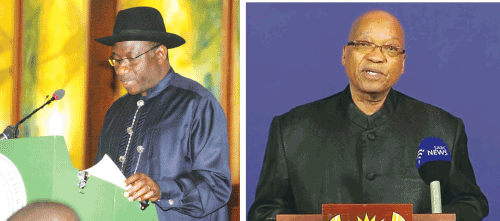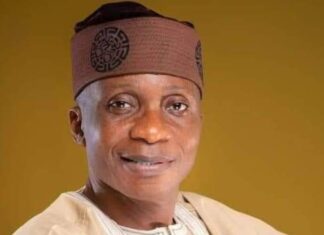Nigeria and South Africa were known to be friends and enjoyed good diplomatic relations. But the recent row over seized money may have badly affected the hitherto cordial relationship, write Head, News Desk, VICTOR EBIMOMI.
Before South Africa was liberated from the apartheid regime in 1994, following the election of the first black president, Nelson Mandela, Nigeria was in the trenches with the country. The most populous Black nation was at the forefront of the countries who were frontally opposed to the apartheid policy in that country, which segregated and oppressed the black majority and favoured the white minority. It contributed both morally and financially.
And because Nigeria’s foreign policy thrust makes Africa its centrepiece, it went all out to implement it. For instance, during the regime of Generals Murtala Mohammed/Olusegun Obasanjo military regime in 1976, Nigeria went a step ahead of other countries that were sympathetic to the oppressed black by nationalising companies owned by countries who supported the apartheid policy. Besides, it was also at the vanguard of the struggle to exempt South Africa from the Commonwealth Games because of its apartheid policy.
But these two countries now seem to be at each other’s jugular, which appears to soil their once close-knit relationship. The crux of the matter, however, is the movement of money from Nigeria to South Africa, which, according to the Nigerian authorities, is meant to procure arms and ammunition.
On September 5, South Africa Customs seized $9.3 million in cash transported by two Nigerians and an Israeli reportedly for arms purchase. Three weeks later, the country impounded another $5.7 million which was also said to have been meant for arms purchase.
Though moving such large amount of cash into a foreign country, including Nigeria, is illegal, Nigeria has continued to argue that the money was legally transported for official purpose, of which the South African authorities are equally aware.
“There is nothing shady about the South African deal and the Office of the NSA (National Security Adviser) has done very well. Because at the appropriate time, they came in that, ‘yes, this money belongs to us and this was what it was meant for.’ That explanation itself was okay. There is no hanky panky on this matter,” Senior Special Adviser to President Goodluck Jonathan on Public Communications, Doyin Okupe, explained.
The Nigerian government maintained that, like the first transaction, the second sum was also to purchase arms from South Africa; and that it was being returned because the private company it paid the money to was not duly registered in South Africa.
“A company was mandated to do a national security assignment for the Federal Government of Nigeria, and because of the extant laws in South Africa, that company was unable to deliver its contractual agreement with the Nigerian government. The company now wants a refund, which is normal,” Okupe said.
Under South African laws, a person entering or leaving the country is expected to carry cash not exceeding $2,300, or the equivalent in foreign currency.
With the current diplomatic face-off, Nigeria has also threatened to fight back, unless South Africa soft-pedals on its high stance.
About 14 South African companies are thriving in Nigeria. They include MTN, Power Giant, Eskom Nigeria, South African Airways, South African Breweries (SAB Miller), Stanbic Bank, Multichoice, Umgeni Water, and Refresh products.
There are also PEP retail stores, Shoprite, LTA Construction, Protea Hotels, Critical Rescue International, South African-Nigeria Communications, Global Outdoor Semces, Oracle and Airtime.
Besides, 14 Southern African companies have also been contracted to collect revenues for PHCN.
The NSA, Col. Sambo Dasuki (rtd), insisted that the deal was legal, expressing concern about the maltreatment of Nigeria by a country which has gained so much from it.
He maintained that Nigeria had provided economic platform to South Africa and thus expected it to be guided by the gesture.
“It is our hope that South Africa would reciprocate this noble gesture,” he said.
Some analysts in Nigeria have also expressed concern that despite the leeway given to South African companies to thrive in Nigeria, there are still officials of the country who are determined to frustrate Nigeria, which in April this year overtook South Africa as Africa’s largest economy.
Dr. Tunde Oseni of the International Relations Department of Lead University, Ibadan, stated that the diplomatic face-off is rooted on ego and rivalry between the two countries.
“Basically, it is an ego thing between South Africa and Nigeria, both politically and economically. This type of diplomatic row is inevitable, particularly between two powerful countries who are usually in rivalry,” he said.
He added that the two most powerful countries in the continent are bound to envy each other, stressing that the current rebasing that makes Nigeria an economic giant ahead of South Africa may not have gone done well with Madiba’s country.
On whether Nigeria really deserves the treatment it is getting from South Africa based on its contribution to the liberation of the country from apartheid, Oseni maintained that though Nigeria might not actually deserve it, the past help should not be the constant refrain.
According to him, since South Africa has achieved its independence from apartheid, the mentality has changed.
“Naturally, Nigeria does not deserve it from South Africa based on its contributions to the country; but they are now in political era, not apartheid,” he said.
Cleric and public affairs commentator, Prof. Peter Okoduwa, noted that it is unfortunate that the countries are having the diplomatic row, and cautioned that it should be handled maturely.
He, however, echoed the words of Oseni that South Africa may not be happy that Nigeria has overtaken it economically.
“What I want to say is my personal view. I am not sure South Africa is happy that Nigeria has become the largest economy in Africa. There are jealousy and anger. That is what I just feel is the problem,” said he.
The Presiding Bishop of Dispensational Gospel Mission International advised that anger and jealousy should not come and rubbish the two countries’ relationship.
Some political analysts, however, argue that Nigeria needs not cry over the matter, as South Africa, despite its short period on the political scene, is more matured and organised than Nigeria that prides itself as the giant of Africa. For them, what could be condoned in Nigeria could be a taboo in South Africa.
“They are implementing their law, so we don’t need to be sentimental on this issue. You should not assume that what we tolerate here will be tolerated by other countries, especially South Africa,” an analyst said.
So far, the row continues and the President of South Africa, Jacob Zuma, seems to keep a distance from the matter.
Zuma’s spokesman, Mac Maharaj, was reported to have told AFP that the president was not part of the committee that reviews arms deals.
But former Nigerian president, Olusegun Obasanjo, and his South African counterpart, Thabo Mbeki, are said to have expressed concern over the diplomatic tension between the two countries. During the Wisdom Forum Gala Night in Johannesburg early in the month, Mbeki stated that while there was a sense that things were not right, there were attempts by the two countries to entrench a positive spirit.
“I think all of us would be concerned about relations. I tend to think of it in positive terms. I know of many Nigerian friends who make efforts to correct what is wrong, and I know South Africans who are of the same view,” Mbeki was quoted to have said.
He added that Zuma and Jonathan were committed to preserving good relations between Nigeria and SA.
“President Zuma does care about this matter and is keen in having it resolved. We should not have an air of animosity. He is keen in having it resolved as is President Jonathan. The current leadership in both countries needs to work hard to ensure this relationship is sustained, but the spirit and will to do so is certainly there,” the former president of the apartheid enclave said.
Obasanjo, in his view, stated that the two nations have had a long-standing partnership, which has yielded many positive results for the two countries and the continent, and so must be sustained.
“I am concerned about relations. There is no reason relations between Nigeria and SA should not be the best. We were hoping that when SA was free, Africa would have two strong handles, and together we will carry the African basket high,” Obasanjo said.
The South Africa National Prosecuting Authority seized the second money, the $5.7 million (about N952 million) because it feels it is the proceeds of illegal transactions.
The first $9.3 million, apparently meant for buying arms for the Nigerian Intelligence Service, was seized from two Nigerians and an Israelis. The men were said to have landed at Lanseria International Airport, Johannesburg, on September 5 in a private jet from Abuja with the money allegedly stashed in three suitcases.
The second transaction was between Cerberus Risk Solutions, an arms broker in Cape Town, and Societe D’Equipment Internationaux, said to be a Nigerian company based in Abuja.
The deal fell apart after Cerberus, which had earlier received from Nigeria R60 million (N1.02 billion) in its account at Standard Bank, tried to repay the money, as it could not resolve its registration formalities with the South African authorities.
Cerberus was said to be previously registered as a broker with the National Conventional Arms Control Committee (NCACC), but the registration expired in May this year.
The marketing and contracting permits also expired at the same time, but the company was said to have since applied for re-registration. However, the application laid in the NCACC’s mailbox for more than two months.
















